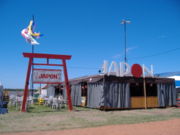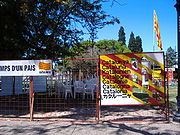
Encuentro y Fiesta Nacional de Colectividades (Rosario, Argentina)
Encyclopedia


Spanish language
Spanish , also known as Castilian , is a Romance language in the Ibero-Romance group that evolved from several languages and dialects in central-northern Iberia around the 9th century and gradually spread with the expansion of the Kingdom of Castile into central and southern Iberia during the...
, Encuentro y Fiesta Nacional de Colectividades) is a cultural event celebrated annually in Rosario
Rosario
Rosario is the largest city in the province of Santa Fe, Argentina. It is located northwest of Buenos Aires, on the western shore of the Paraná River and has 1,159,004 residents as of the ....
, province
Provinces of Argentina
Argentina is subdivided into twenty-three provinces and one autonomous city...
of Santa Fe
Santa Fe Province
The Invincible Province of Santa Fe, in Spanish Provincia Invencible de Santa Fe , is a province of Argentina, located in the center-east of the country. Neighboring provinces are from the north clockwise Chaco , Corrientes, Entre Ríos, Buenos Aires, Córdoba, and Santiago del Estero...
, Argentina
Argentina
Argentina , officially the Argentine Republic , is the second largest country in South America by land area, after Brazil. It is constituted as a federation of 23 provinces and an autonomous city, Buenos Aires...
, since 1985.
This event showcases the diversity of customs of the many established communities of immigrants that live in the city and around. It is locally known simply as las Colectividades, and usually held in the middle of spring (the first days of November), though in 2004 it was celebrated in December instead, to avoid overlapping with the Third International Congress of the Spanish Language
Third International Congress of the Spanish Language
The Third International Congress of the Spanish Language was a cultural event that took place in Rosario, Argentina, on 17, 18 and 19 November 2004....
(held in Rosario in mid-November). Tents, kiosks and several performing stages are set up in the National Flag Park (Parque Nacional a la Bandera), a large expanse on the shore of the Paraná River
Paraná River
The Paraná River is a river in south Central South America, running through Brazil, Paraguay and Argentina for some . It is second in length only to the Amazon River among South American rivers. The name Paraná is an abbreviation of the phrase "para rehe onáva", which comes from the Tupi language...
, right opposite the National Flag Memorial
National Flag Memorial (Argentina)
The National Flag Memorial in Rosario, Argentina, is a monumental complex built near the shore of the Paraná River...
. Immigrant communities devote their space to selling typical foods and drinks, as well as other items, or for exhibits. The stages are devoted to the performance of dances and music. The festival is attended every year by tens of thousands of local residents and tourists.
In recent years, the Colectividades were marred by poor organization and abuse on the part of some communities, which in effect turned their spaces into common open-air bars and barbecue
Barbecue
Barbecue or barbeque , used chiefly in the United States, Canada, the United Kingdom, New Zealand and Australia is a method and apparatus for cooking meat, poultry and occasionally fish with the heat and hot smoke of a fire, smoking wood, or hot coals of...
s. Alcohol abuse
Alcoholism
Alcoholism is a broad term for problems with alcohol, and is generally used to mean compulsive and uncontrolled consumption of alcoholic beverages, usually to the detriment of the drinker's health, personal relationships, and social standing...
by some attenders, robberies
Robbery
Robbery is the crime of taking or attempting to take something of value by force or threat of force or by putting the victim in fear. At common law, robbery is defined as taking the property of another, with the intent to permanently deprive the person of that property, by means of force or fear....
, problems with public transport
Public transport
Public transport is a shared passenger transportation service which is available for use by the general public, as distinct from modes such as taxicab, car pooling or hired buses which are not shared by strangers without private arrangement.Public transport modes include buses, trolleybuses, trams...
ation and traffic congestion
Traffic congestion
Traffic congestion is a condition on road networks that occurs as use increases, and is characterized by slower speeds, longer trip times, and increased vehicular queueing. The most common example is the physical use of roads by vehicles. When traffic demand is great enough that the interaction...
in the area of the festival caused many people to complain or to miss the celebration altogether. In light of this and the recently increased touristic flow into the city, for 2005 the municipal government added special requirements for the communities' exhibits, such as a percentage of space to be devoted to cultural activities and the sale of typical foods only, and a change of the layout. The 2005 celebration was, accordingly, deemed better organized and safer than the previous ones, and attendance during its ten days reached about 1 million.

